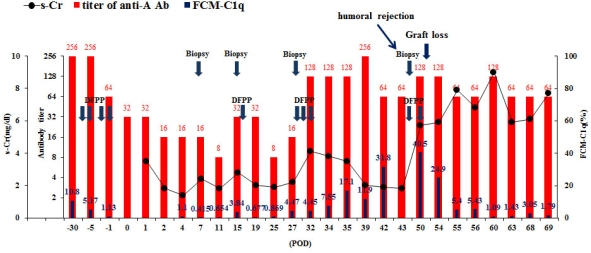Novel Flow Cytometry Method for Detecting Complement-Fixing Blood Group IgG Antibody in ABO-Incompatible Renal Transplantation
1Transplant Immunology, Tokyo Women's Medical University, Shinjuku ward, Tokyo, Japan
2Surgery III, Tokyo Women's Medical University, Shinjuku ward, Tokyo, Japan.
Meeting: 2015 American Transplant Congress
Abstract number: A133
Keywords: Antibodies, FACS analysis, Kidney transplantation
Session Information
Session Name: Poster Session A: Kidney Antibody Mediated Rejection
Session Type: Poster Session
Date: Saturday, May 2, 2015
Session Time: 5:30pm-7:30pm
 Presentation Time: 5:30pm-7:30pm
Presentation Time: 5:30pm-7:30pm
Location: Exhibit Hall E
【Background】We experienced a hyperacute rejection (HAR) in ABO-incompatible renal transplantation (ABO-I RTx) on POD 0. We hypothesized that complement-fixing IgG anti-A/B blood group antibody (anti-A/B Ab) played a critical role in developing antibody mediated acute rejection (AMAR) in ABO-I RTx and developed a novel flow cytometry method for complement C1q (FCM-C1q) to detect it.
【Method】We selected a few ABO-I RTx recipients who developed severe HAR or severe AMAR. We then tested their stored pre/post-transplant serum for C1q level on anti-A/B Ab by FCM-C1q.
【Results】A 60-year old female underwent ABO-I RTx. No immunological risk was detected by conventional tests before surgery with anti-A Ab titer ×32 on POD 0. She, however, developed so severe a HAR during the operation that there was no other way than to perform graftectomy. Her FCM-C1q level on –2POD was as high as 68.1%. A 58-year old male underwent ABO-I RTx. All pre-transplant immunological tests were negative with anti-A Ab titer ×32 on POD 0. Then s-Cr began to rise on POD 7 developing severe AMAR and we were forced to conduct graftectomy on POD 10. His FCM-C1q level on –8POD was 75.2%. Although it had fallen down to 0.616% on POD 4 probably due to preoperative plasma exchanges, it gradually turned to rise after POD 7. A 39-year old male underwent ABO-I RTx. He developed severe humoral rejection (HR) on POD 48 and lost graft on POD 51. His FCM-C1q levels stayed < 1% until POD25. It rose to 4.47% and a biopsy on POD 28 showed borderline HR for the first time. It went up to > 10% after POD35 and moderate HR with intravascular coagulation was found in a biopsy on POD 48. He lost graft on POD51 with FCM-C1q level 40.5% on POD 50.
His FCM-C1q levels stayed < 1% until POD25. It rose to 4.47% and a biopsy on POD 28 showed borderline HR for the first time. It went up to > 10% after POD35 and moderate HR with intravascular coagulation was found in a biopsy on POD 48. He lost graft on POD51 with FCM-C1q level 40.5% on POD 50.
【Conclusion】Our case study with FCM-C1q suggested a possibility that presence of complement-fixing anti-A/B Ab was more essential in developing AMAR and HAR in ABO-I RTx than a whole level of anti-A/B Ab titer.
To cite this abstract in AMA style:
Ishizuka T, Yasuo M, Ishida Y, Miura H, Iwadoh K, Murakami T, Kitajima K, Nakajima I, Fuchinoue S. Novel Flow Cytometry Method for Detecting Complement-Fixing Blood Group IgG Antibody in ABO-Incompatible Renal Transplantation [abstract]. Am J Transplant. 2015; 15 (suppl 3). https://atcmeetingabstracts.com/abstract/novel-flow-cytometry-method-for-detecting-complement-fixing-blood-group-igg-antibody-in-abo-incompatible-renal-transplantation/. Accessed February 26, 2026.« Back to 2015 American Transplant Congress
